Key takeaways:
- Ethical storytelling emphasizes respect, authenticity, and the responsibility to honor the subjects’ narratives without exploiting their experiences.
- Effective storytelling in advocacy humanizes complex issues, fostering empathy and motivating collective action through personal narratives.
- Key principles of ethical storytelling include accuracy, informed consent, and centering the voices of those directly impacted by the narrative.
- Challenges include the risk of oversimplification, balancing emotional resonance with respect for individuals’ experiences, and maintaining ethical integrity against the pressure to engage audiences.
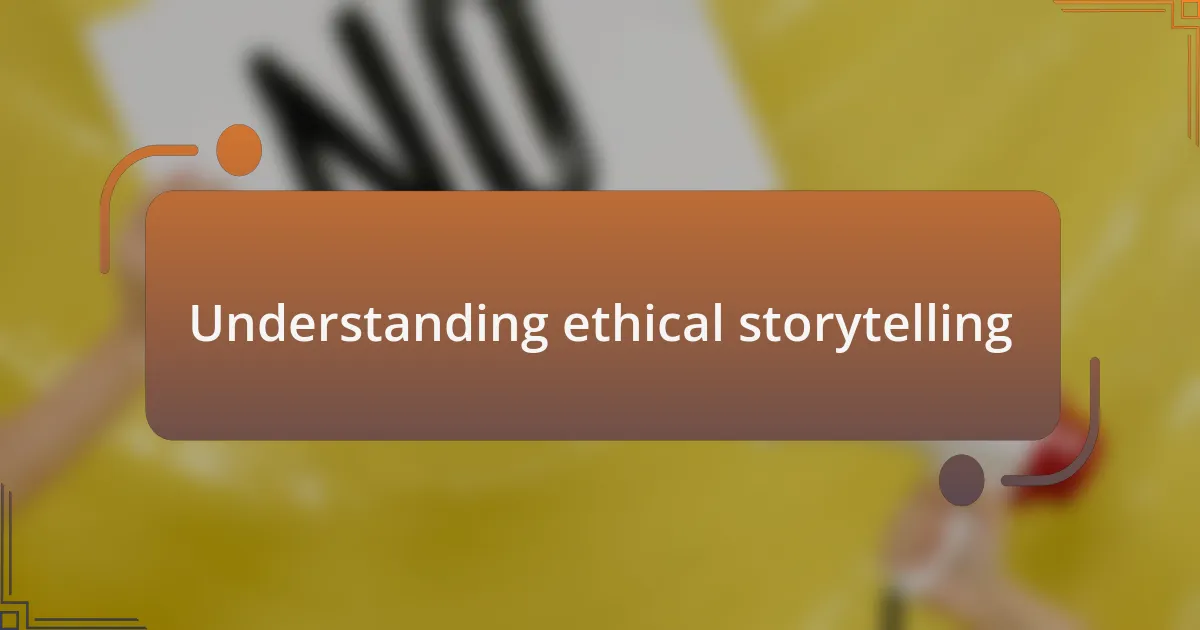
Understanding ethical storytelling
Ethical storytelling is about more than just sharing experiences; it’s about doing so with respect and authenticity. During one of my earlier advocacy events, I had the opportunity to listen to a woman share her journey regarding her unexpected pregnancy. Her story wasn’t just personal; it resonated with numerous attendees and sparked meaningful conversations about choices and consequences. In moments like that, I realized the power of truth; it can foster understanding and compassion, which is the essence of ethical storytelling.
When I consider what it means to be ethical in storytelling, I often reflect on the responsibility to the subjects of our narratives. For instance, there was a time when I was tempted to embellish certain details to make a story more compelling. I paused, questioning whether that approach would honor the real struggles faced by others. This reflection deepened my appreciation for presenting stories that neither exploit nor sensationalize individuals and their journeys, recognizing the dignity inherent in each unique experience.
Moreover, I’ve learned that ethical storytelling necessitates a focus on the audience’s emotional journey as well. By sharing relatable experiences, I’ve found that listeners can connect deeply with the realities behind pro-life advocacy. How can we convey a message that resonates while remaining truthful and respectful? In my experience, it requires active listening and empathy, ensuring that every story told enriches the conversation rather than dilutes it.
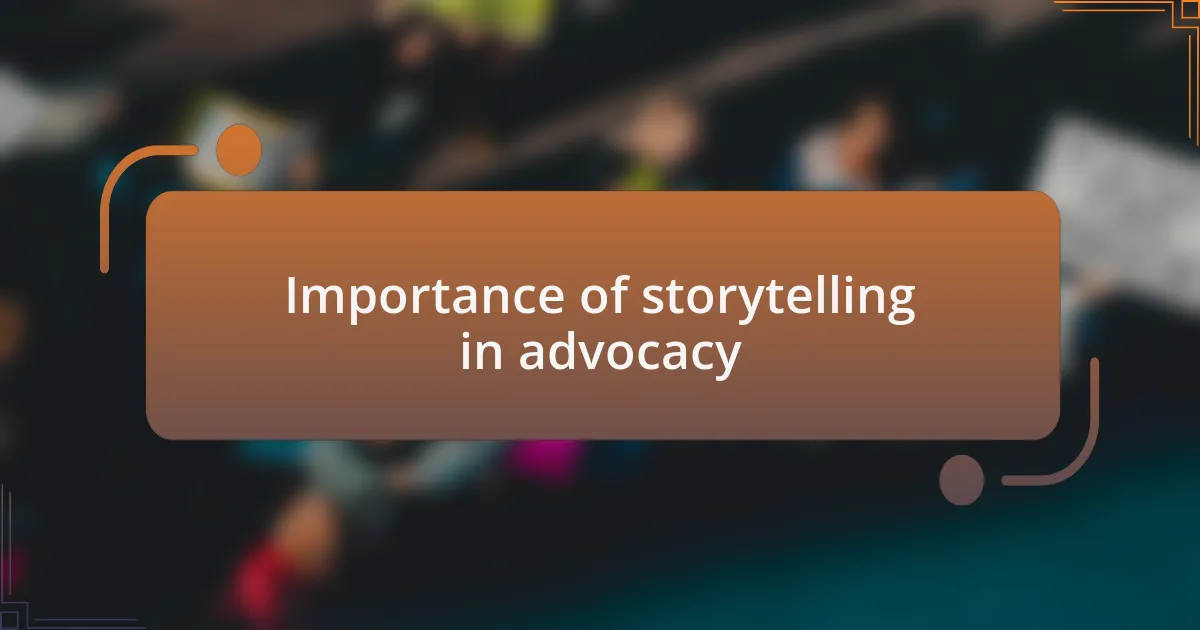
Importance of storytelling in advocacy
Storytelling is a critical tool in advocacy because it humanizes complex issues. I recall attending a community meeting where a father bravely spoke about his journey after an unexpected pregnancy. His candidness brought to light the often-overlooked struggles and joys of parenting, fostering empathy among attendees. It’s moments like these that remind me of how personal narratives can create a bridge for understanding, highlighting the need for compassion in discussions surrounding sensitive topics.
Additionally, effective storytelling acts as a catalyst for change. During a workshop I facilitated, participants shared their own experiences, and I noticed how each story sparked a sense of urgency and action among listeners. I couldn’t help but think, why does a single story have the power to motivate entire groups? It’s likely because stories evoke emotions that statistics alone cannot. They compel us to reflect, understand, and often lead us to take action in ways that cold facts simply can’t.
Ultimately, integrating storytelling into advocacy fosters a shared sense of community and belonging. I’ve seen how individuals can transform from passive listeners into involved advocates simply by resonating with a narrative. Isn’t it fascinating how a personal account can not only inform but also inspire others to join a cause? In my experience, that’s the crux of effective advocacy: weaving together our stories to forge connections that drive collective action.
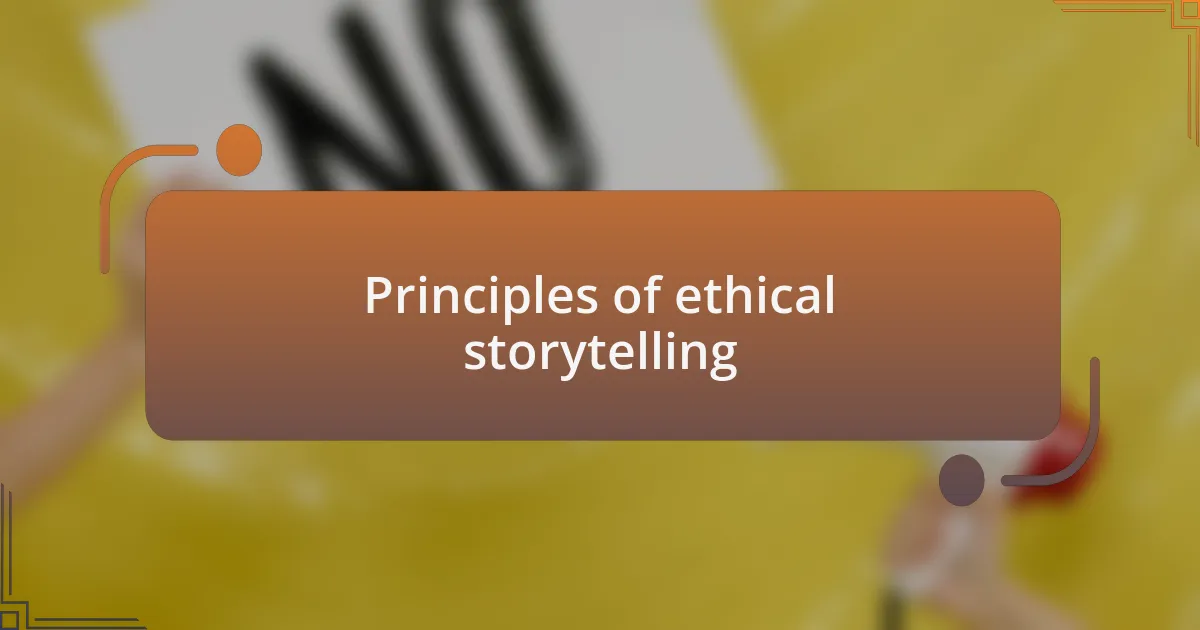
Principles of ethical storytelling
When it comes to ethical storytelling, accuracy is paramount. I remember a time when I shared a personal story of a friend who faced challenges after a birth. It was crucial that I remained true to her experience while respecting her privacy. Ethical storytelling means presenting facts and narratives honestly, ensuring that no details are exaggerated or manipulated to evoke undue sympathy. Isn’t it essential that we honor the authenticity of the voices we aim to amplify?
Another fundamental principle is informed consent. I often think back to a project where I interviewed individuals about their experiences, ensuring they were comfortable sharing their stories. Each participant had the right to control how their narrative was portrayed. This respect fosters trust and ensures that we are not exploiting anyone’s story for our agendas. How can we claim to advocate effectively when we don’t fully honor those whose stories we tell?
Lastly, it’s important to center the subjects of our stories. I once observed a campaign that elevated the experiences of marginalized voices, highlighting their expertise and perspectives rather than overshadowing them. This approach not only amplifies their experiences but also empowers them to be active participants in their narratives. Isn’t it our responsibility as advocates to shift the spotlight to those who truly matter in these discussions?
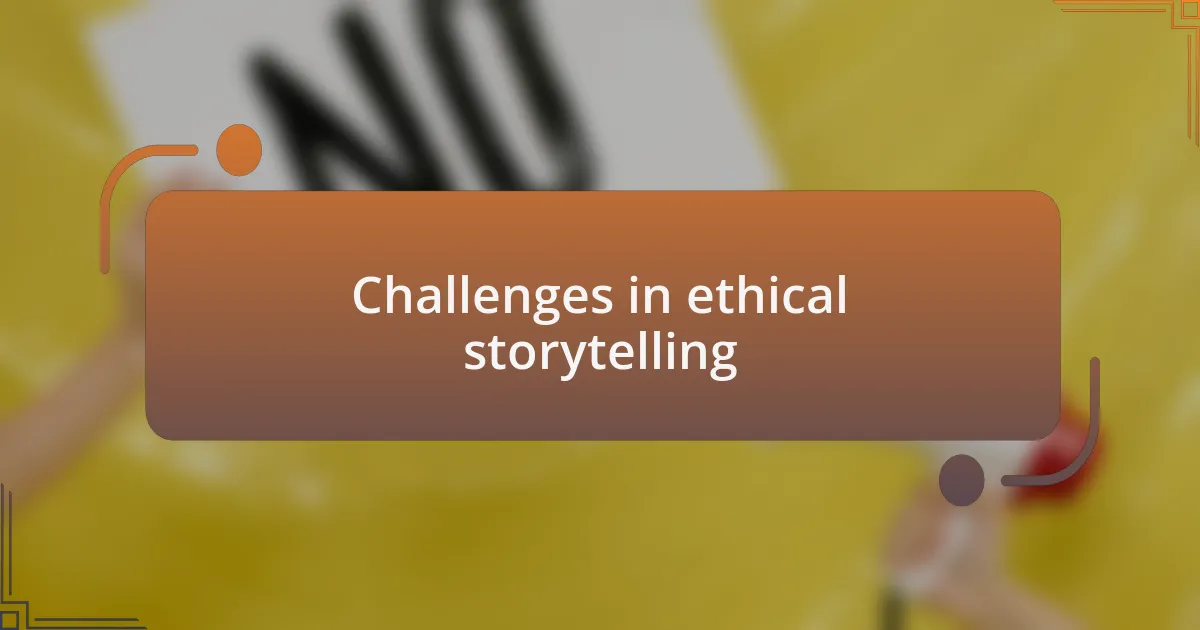
Challenges in ethical storytelling
One significant challenge in ethical storytelling is the risk of oversimplifying complex narratives. I once wrote about a woman’s journey through a difficult pregnancy, and while my intention was to highlight her strength, I inadvertently overlooked the multitude of factors that shaped her experience. This simplification not only diminishes the nuances of her story but can also mislead audiences about the reality of such situations. How can we truly capture the full spectrum of a person’s journey if we only present a single facet?
Another obstacle lies in balancing emotional resonance without exploiting pain. I recall a moment when I shared a story that moved my audience deeply, but afterward, I felt uneasy about how I portrayed the individual involved. It struck me that evoking empathy shouldn’t come at the cost of reducing someone’s lived experience to a mere tool for engagement. Shouldn’t our goal be to uplift rather than to use others’ hardships as mere emotional triggers?
Moreover, I find that the pressure to create compelling narratives can sometimes overshadow ethical responsibilities. In a workshop, I heard passionate advocates share stories that undoubtedly resonated, yet I couldn’t help but wonder if these narratives respected the dignity of the individuals involved. Are we prioritizing engagement over integrity? This careful balancing act is vital if we’re to remain true to the principles of ethical storytelling.
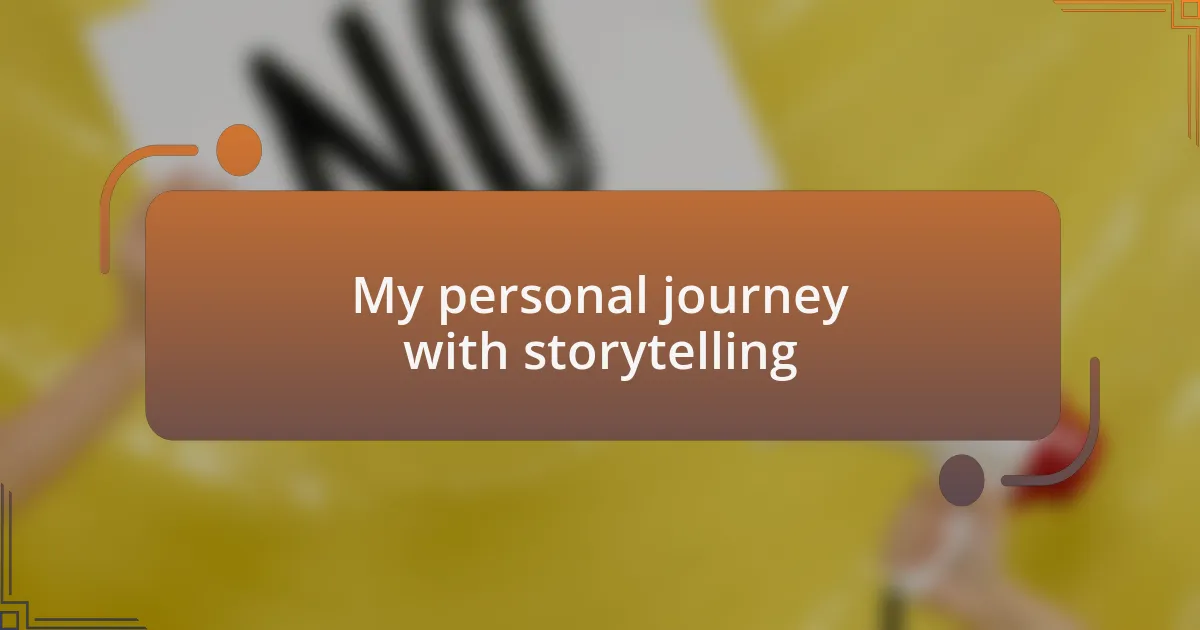
My personal journey with storytelling
My personal journey with storytelling has been a transformative experience. Early on, I was naive, believing that heartfelt narratives alone would resonate with audiences. Yet, I vividly remember a time when I shared a story about a young mother facing an unplanned pregnancy. While it touched many, I later realized that the essence of her struggle was diluted because I had unintentionally glossed over the societal pressures she faced. Why is it that we sometimes prioritize the emotional punch over the actual complexity of someone’s reality?
As I grew in my approach, I started to embrace the value of authenticity. There was a moment when I interviewed a woman who had made the incredibly difficult choice to place her child for adoption. Listening to her articulate the myriad of emotions she felt through every stage of her decision was eye-opening. This wasn’t just a story; it was a multifaceted journey that offered insights into love, sacrifice, and hope. How could I have thought otherwise? Each person’s narrative is layered, and it became clear to me that my responsibility was to honor that depth.
This evolution in my storytelling mindset has made me more aware of the ethical dimensions involved. One particularly impactful experience was during a community gathering where I shared a friend’s journey through infertility. I chose to focus not just on her pain, but also on her resilience and the support she garnered. The conversations that followed reminded me just how important it is to foster dialogue rather than merely elicit sympathy. I often ask myself, are we engaging in storytelling that not only connects but also empowers?

Lessons learned from my experiences
One of the key lessons I’ve learned is the importance of listening deeply before telling a story. I recall a workshop where I was paired with a woman who had faced severe judgment after her teen pregnancy. As she recounted her experiences, I realized that my initial assumptions about her situation were off base. How often do we let our biases shape the narratives we’re trying to convey? I’ve found that stepping back and truly hearing someone’s voice can completely transform the story and enrich its impact.
Another profound insight emerged during a discussion about the complexities of parenting choices. I shared my own experience of being a parent and the weight of those decisions, especially when faced with societal expectations. It prompted me to reflect: what role do our own experiences play in shaping the messages we share? I discovered that when I infused my personal context into storytelling, it not only humanized the narrative but also invited others to share their journeys, creating a communal space for understanding.
Each encounter has emphasized that ethical storytelling isn’t just about sharing; it’s about fostering genuine connections. For instance, I remember facilitating a panel where various perspectives on pro-life advocacy were voiced. The exchange was electric, highlighting how understanding and empathy could bridge divides. It made me think, could our differences actually propel us towards deeper compassion if only we engage in open dialogue? This revelation has influenced not only how I tell stories but also how I approach conversations in my advocacy efforts.
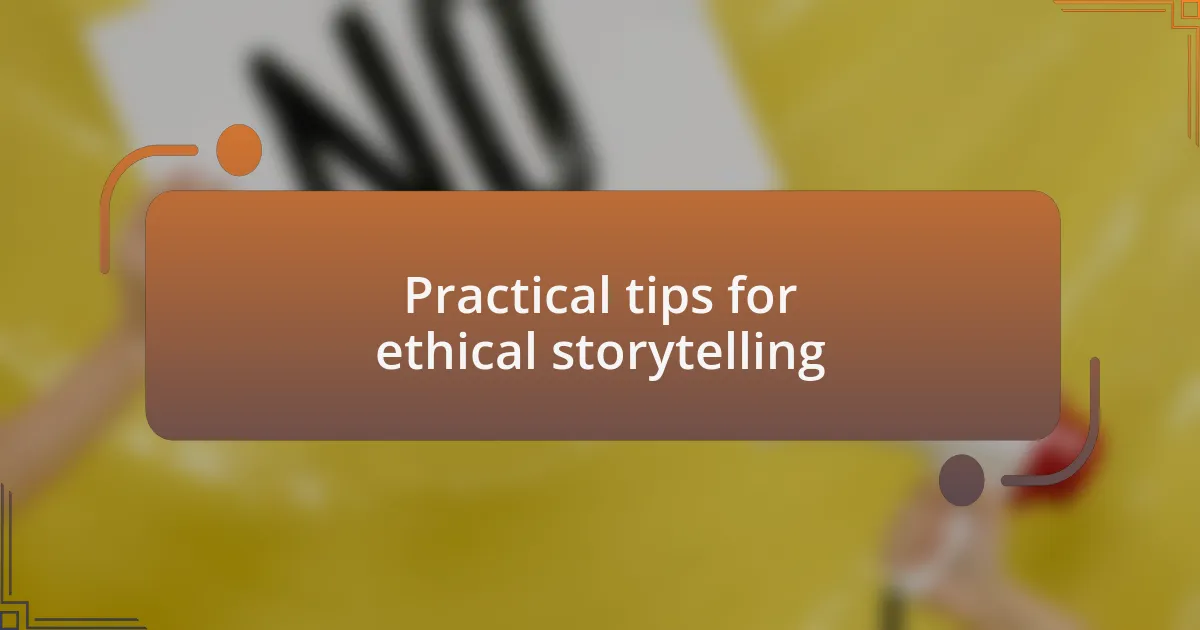
Practical tips for ethical storytelling
When crafting an ethical story, one practical tip is to prioritize the voices of those directly affected by the issue. For instance, during a community outreach event, I collaborated with mothers who had faced unwanted pregnancies. Listening to their raw, unfiltered truths taught me that their lived experiences needed to shine through, guiding how we shaped our narratives. What better way to honor their journeys than by letting them lead the conversation?
Another effective strategy is to approach storytelling with empathy and a commitment to accuracy. I recall a situation where I experienced pushback for sharing a statistic that, while compelling, didn’t portray the whole story. Realizing the power this data held, I dove deeper and sought out qualitative accounts from those behind the numbers. This not only fortified the integrity of my message but reinforced my belief: storytelling should illuminate nuances rather than oversimplify realities.
Lastly, it’s essential to be mindful of our own biases and the potential consequences of our narratives. For example, I once shared a powerful triumph in my advocacy, only to later reflect on how it might overshadow the struggles of those still seeking resolution. It led me to ask myself: is my storytelling empowering or inadvertently marginalizing others? Embracing vulnerability in my narratives allows for a broader spectrum of experiences to emerge, nurturing both authenticity and connection.